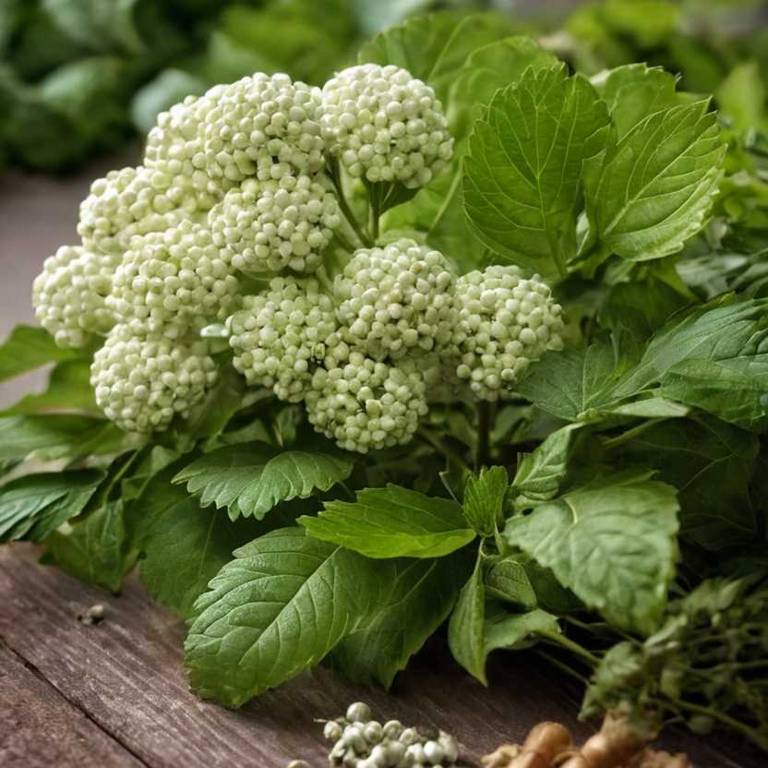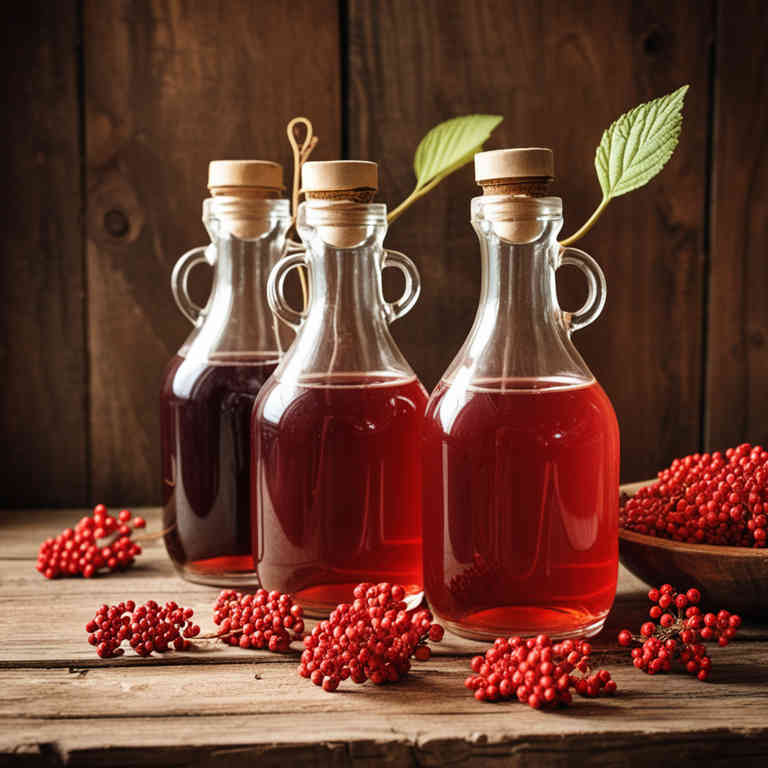10 Best Viburnum Opulus Preparations

The best medicinal preparations of Viburnum opulus are teas, decoctions, tinctures, syrups, and mucillages, each offering unique therapeutic benefits.
Teas made from the dried leaves and berries are commonly used to soothe digestive issues and reduce inflammation.
Decoctions involve boiling the bark or roots to extract more potent compounds, often used for respiratory and skin conditions.
Tinctures, prepared with alcohol, provide a concentrated form for internal or topical use.
Syrups made from the berries are popular for their soothing effects on coughs and sore throats, while mucillages, derived from the plant's tissues, act as demulcents to relieve irritation in the throat and gastrointestinal tract.
Below there's a list of the 10 best herbal preparations of viburnum opulus for medicinal purposes.
- 1. Teas
- 2. Decoctions
- 3. Tinctures
- 4. Syrups
- 5. Mucillages
- 6. Capsules
- 7. Creams
- 8. Juices
- 9. Linctuses
- 10. Lozenges
1. Teas
Viburnum opulus teas is commonly used to treat digestive issues, menstrual cramps, and respiratory conditions.
This herbal preparation is often employed to alleviate symptoms of indigestion, bloating, and nausea due to its mild laxative and carminative effects. It is also used in traditional medicine to ease menstrual pain and reduce inflammation. The most common ailments treated with viburnum opulus teas include gastrointestinal discomfort, hormonal imbalances, and inflammatory conditions.
The bioactive constituents responsible for its medicinal properties include flavonoids, tannins, and essential oils, which contribute to its anti-inflammatory, antispasmodic, and mild diuretic effects.

2. Decoctions
Viburnum opulus decoctions is commonly used to treat various ailments such as digestive issues, inflammation, and skin conditions.
The decoctions are traditionally employed for their anti-inflammatory, antimicrobial, and astringent properties. They are often used to alleviate symptoms of diarrhea, sore throat, and urinary tract infections. The bioactive constituents responsible for these effects include flavonoids, tannins, and phenolic acids, which contribute to the plant's therapeutic value.
Additionally, some studies suggest that these compounds may have antioxidant and immune-modulating effects.

3. Tinctures
Viburnum opulus tinctures is commonly used to treat respiratory conditions, such as coughs and bronchitis, as well as digestive issues like indigestion and inflammation.
These tinctures are also used for their antispasmodic and diuretic properties, helping to alleviate symptoms of urinary tract infections and menstrual cramps. The most common medicinal uses include easing respiratory congestion, reducing inflammation, and supporting digestive health. The bioactive constituents responsible for these effects include flavonoids, iridoids, and tannins, which possess antioxidant, anti-inflammatory, and antimicrobial properties.
These compounds work synergistically to provide the plant's therapeutic benefits.

4. Syrups
Viburnum opulus syrups is commonly used to treat respiratory and digestive ailments, such as coughs, bronchitis, and indigestion.
The preparation is valued for its soothing and anti-inflammatory properties, which help alleviate symptoms of these conditions. It is also sometimes used to support immune function and reduce fever. The most common bioactive constituents include flavonoids, tannins, and essential oils, which contribute to its medicinal effects.
These compounds work together to provide antimicrobial, antioxidant, and mild sedative benefits.

5. Mucillages
Viburnum opulus mucillages is commonly used to soothe digestive issues, reduce inflammation, and support skin health.
The mucillages, which are gel-like substances extracted from the plant, are widely utilized in traditional medicine to treat ailments such as gastritis, ulcers, and skin irritations. They are also applied topically for their healing properties in treating wounds and eczema. The bioactive constituents responsible for these effects include mucilage polysaccharides, tannins, flavonoids, and phenolic compounds.
These components contribute to the anti-inflammatory, antioxidant, and wound-healing properties of the preparation.

6. Capsules
Viburnum opulus capsules is commonly used to support digestive health, alleviate menopausal symptoms, and reduce inflammation.
The most common medicinal uses of this herbal preparation include treating digestive disorders such as bloating and indigestion, managing hormonal imbalances, and reducing inflammatory conditions like arthritis. The bioactive constituents responsible for its medicinal properties include flavonoids, tannins, and essential oils, which possess antioxidant, anti-inflammatory, and mild estrogenic effects. These compounds contribute to the plant's ability to soothe the gastrointestinal tract and regulate hormonal activity.
Viburnum opulus capsules are also sometimes used to support urinary tract health and reduce fever.

7. Creams
Viburnum opulus creams is commonly used to treat skin conditions such as eczema, psoriasis, and minor wounds due to their anti-inflammatory and soothing properties.
These creams are often applied topically to reduce redness, irritation, and promote skin healing. The most common medicinal uses include alleviating symptoms of dermatitis, reducing inflammation, and supporting skin regeneration. The bioactive constituents responsible for these effects include flavonoids, tannins, and essential oils, which have antioxidant, antimicrobial, and anti-inflammatory properties.
These compounds work synergistically to enhance the therapeutic benefits of the herbal preparation.

8. Juices
Viburnum opulus juices is commonly used to treat ailments such as inflammation, digestive issues, and skin conditions.
The preparation is often employed in traditional medicine to alleviate symptoms of arthritis, gout, and menstrual cramps. It is also used to support respiratory health and reduce fever. The bioactive constituents responsible for its medicinal properties include flavonoids, tannins, and phenolic acids, which have anti-inflammatory, antioxidant, and antimicrobial effects.
These compounds contribute to its ability to soothe inflammation and support the body's natural healing processes.

9. Linctuses
Viburnum opulus linctuses is commonly used to relieve symptoms of respiratory tract infections, such as coughs, sore throat, and bronchitis.
It is often prepared as a syrup or gargle and is valued for its soothing and anti-inflammatory properties. The most common medicinal uses include treating coughs, inflammation of the throat, and mild respiratory discomfort. The bioactive constituents responsible for its medicinal effects include flavonoids, tannins, and mucilage, which have antimicrobial, astringent, and demulcent properties.
These compounds help reduce irritation and inflammation in the respiratory tract, making it a traditional remedy for throat and lung conditions.

10. Lozenges
Viburnum opulus lozenges is commonly used to alleviate symptoms of respiratory tract infections, sore throat, and cough.
These lozenges are often employed to reduce inflammation and soothe irritation in the throat, making them popular for treating conditions like pharyngitis and laryngitis. The most common medicinal uses include relief from sore throat, cough, and inflammation of the upper respiratory tract. Bioactive constituents such as flavonoids, tannins, and essential oils contribute to the anti-inflammatory, antimicrobial, and astringent properties of the preparation.
These compounds work synergistically to provide therapeutic benefits for various respiratory ailments.
